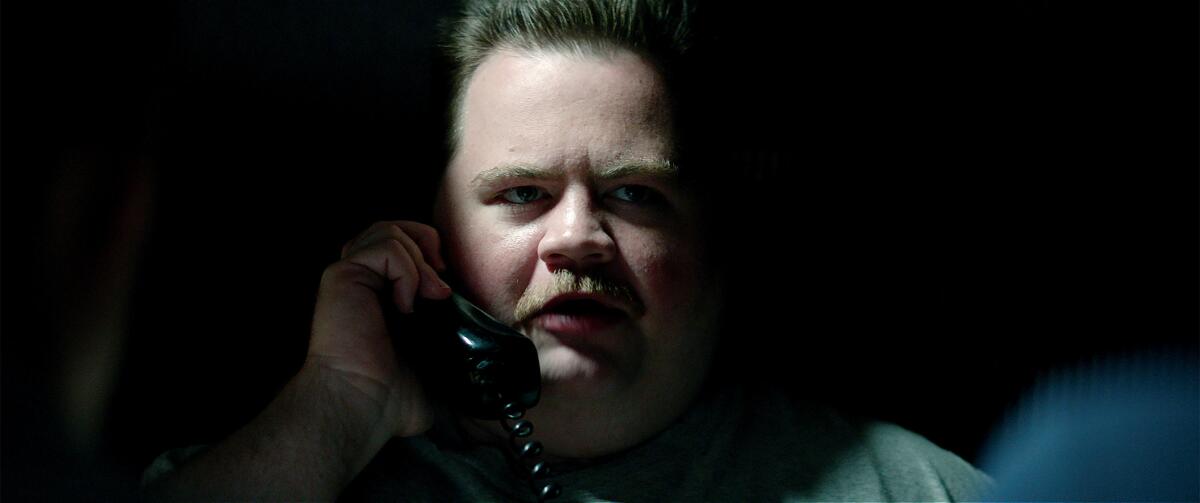Review: Clint Eastwood’s ‘Richard Jewell’ illuminates a real-life nightmare

- Share via
Powered by some potent acting, Clint Eastwood’s strong and involving “Richard Jewell” is the latest example of a genre that is one of Hollywood’s most durable: An innocent unjustly accused is all but obliterated by the indifferent forces of authority.
With examples ranging from Alfred Hitchcock’s 1956 “The Wrong Man” to 1932’s Paul Muni-starring “I Am a Fugitive From a Chain Gang” (both, like “Richard Jewell,” based on real events), this disturbing narrative even shares elements that go back as far as Victor Hugo’s often-dramatized 1862 novel “Les Misérables.”
For the record:
12:14 p.m. Dec. 13, 2019Hitchcock’s “The Wrong Man” was released in 1956, not 1951 as originally stated.
But because “Richard Jewell” is arriving at a particularly polarizing moment, even before it hit theaters the story it tells has become enmeshed in various controversies just as the real-life Jewell, falsely suspected in a deadly bombing at Atlanta’s 1996 Olympics, had his story overwhelmed by the imperatives of power elites.
So words have flown pro and con about whether the film maligns the Atlanta Journal-Constitution, which first published the FBI’s suspicions of Jewell, defames the reporter who broke the story, or even should be seen as a covert pro-Trump manifesto.
Some of these accusations have more validity than others, but Jewell himself, who died in 2007 at age 44, would likely hope that at least this once attention would be paid to his story, and to the price he paid for believing that law enforcement officials could do no wrong.
Written by the accomplished Billy Ray based on a Vanity Fair article by Marie Brenner (whose work was the basis of “The Insider”), and also using the book “The Suspect” by Kent Alexander and Kevin Salwen as a source, “Richard Jewell” benefits as well from Eastwood’s way of working with film.
At this point in his career, the 89-year-old director has perfected what might be called a Zen-like style of no style. Nothing is as important to him as the streamlined delivery of a story, and he’s gotten so good at it that his tales often seem to be telling themselves.
“Richard Jewell” begins a decade before the bombing, in 1986, with its protagonist working as a supply clerk at the Atlanta office of the U.S. Small Business Administration.
Given that part of his jobs is delivering snacks, it’s no surprise that Jewell, sensitively played by Paul Walter Hauser, has the hefty look of someone who’s had a few too many himself.
Even at these early stages, it’s clear that Jewell is a bit of an odd guy: shy, earnest, finicky about details and committed to saying “yes, sir” at every opportunity. The fact that he’s looking forward to a career in law enforcement is no surprise either.
The only SBA employee who doesn’t give Jewell a hard time is Watson Bryant (a splendid Sam Rockwell), an attorney who is both the smartest guy in the room and so incendiary that a move to private practice is inevitable.
A decade later, Jewell finds work as a security guard at the Olympics. Though he’s disheartened that all he will be doing is watching over stereo equipment in Centennial Park, his mom and biggest fan, Bobi (a dead-on Kathy Bates), reminds him “it is still law enforcement.”
If Jewell has a polar opposite in the film, it’s Atlanta Journal-Constitution reporter Kathy Scruggs (Olivia Wilde). Attractive, ambitious and unscrupulous, she will do almost anything in pursuit of a story, including, the film tells us — apparently without evidence — trading the promise of sex for a tip in the bombing cases.
Her character undeniably verges on meretricious cliché, but Wilde, who has defended the portrait in numerous interviews, throws herself completely into the role and asks us to make up our own minds.
On the night of the bombing, we watch as Jewell discovers the device and helps in moving crowds away from it, thus averting more casualties than the one dead and over 100 wounded that resulted.
Initially hailed as a hero, he gets caught in the FBI’s crosshairs as a potential suspect because of intense pressure to find somebody, anybody, to pin the blame on. Once Scruggs’ story reveals his name and a ferocious media storm overtakes him, Jewell’s life is never the same.
One of the things “Richard Jewell” is adept at is showing exactly how unscrupulous the FBI, personified by fictionalized agent Tom Shaw (Jon Hamm), is at taking advantage of Jewell’s naivete and his blind faith in all things law and order.
The film also shines at portraying the mutually frustrating but ultimately life-saving odd-couple relationship between Jewell and attorney Bryant, whom Jewell hires because he’s the only lawyer he knows.
The key reason “Richard Jewell” works as well as it does is the perceptive nature of Hauser’s lead performance. His sense of who this character is, how he thinks about himself at his core, leads to scenes with both Rockwell and Bates that are unexpectedly powerful. A lifelong seeker after respect, Richard Jewell gets it here at last.
'Richard Jewell'
Rating: R, for language, including some sexual references, and brief bloody images
Running time: 2 hours, 11 minutes
Playing: In general release
More to Read
Only good movies
Get the Indie Focus newsletter, Mark Olsen's weekly guide to the world of cinema.
You may occasionally receive promotional content from the Los Angeles Times.











